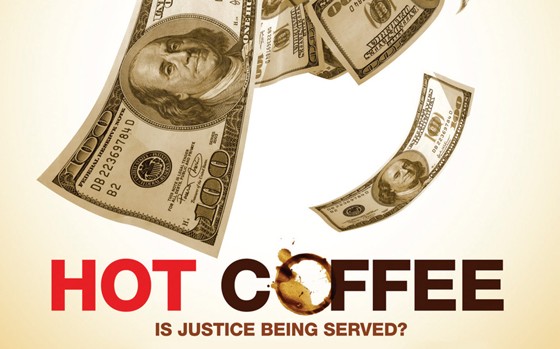
5 Reasons “Hot Coffee” Should be Your Netflix Pick
In 2011, the documentary “Hot Coffee” sought to set the record straight about the infamous McDonald’s coffee case. Now, the movie is having a renaissance on Netflix. Here are five lies about the hot coffee myth that are sure to get your blood boiling:
- McDonalds knew the coffee was dangerously hot. From 1982 to the time Stella Liebeck suffered burns from McDonalds coffee in 1992, over 700 people filed complaints and suits after being burned by the restaurant’s coffee. At the time of Liebeck’s injuries, McDonalds served its coffee at a scalding 180-190 degrees. A liquid served at that temperature could cause third degree burns in two to seven seconds according to experts in the case. McDonalds started serving its coffee a full 10 degrees cooler after Liebeck won her case.
2. Liebeck wasn’t driving when she spilled on herself. As Liebeck’s story spread across the globe, the facts started to morph into the myth we know today. Many news outlets began reporting that Liebeck was driving with the coffee in her lap at the time of the spill. But, Liebeck was sitting in the passenger seat of a parked car when she suffered third degree burns.
3. Liebeck suffered serious third degree burns. Liebecks injuries were anything but frivolous. The 79-year-old had burns on 16% of her body. With 6% of her body covered in burns, Liebeck required treatment in the hospital for eight days before starting her two year recovery process.
4. At the age of 79, Liebeck had never sued anyone else. Prior to her suit, Liebeck had never filed suit against another party and she wanted to avoid a legal battle with McDonalds. But, after the restaurant offered her $800 for her $10,000 medical bill, Liebeck decided to take legal action.
5. The judgment was not $2 million. The jury initially awarded over 2 million in punitive damages, or two days of Mcdonald’s coffee profits, after discovering that McDonalds repeatedly ignored the danger of their scalding coffee. But, the judge later reduced the award to $480,000.
Since Hot Coffee premiered in 2011, many other sources have sought to tell the truth about the case. In 2013, the New York Times revisited the case and attempted to set the record straight.
Watch “Hot Coffee” on Netflix or HBO Go now.
Learn Category: